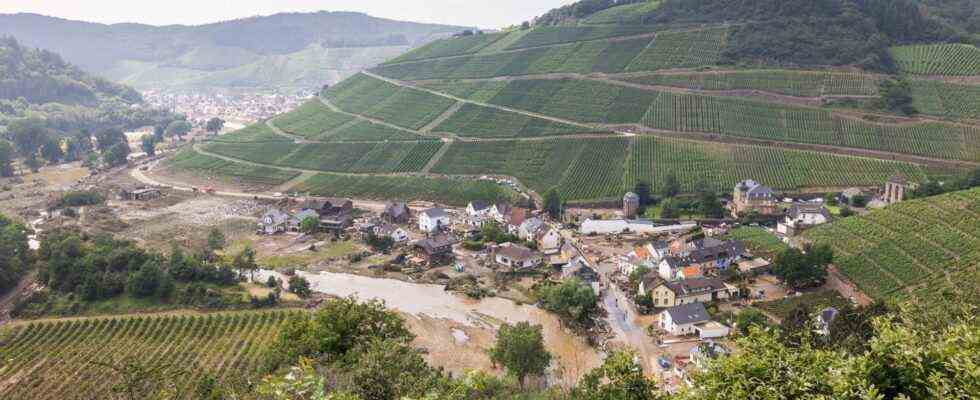Status: 07/30/2021 1:59 p.m.
The flood disaster also caused enormous damage to wine growers in Rhineland-Palatinate. Many vintners from the Ahr valley are facing the end – but help is coming from other wine-growing regions.
After the flood disaster in the Rhineland-Palatinate Ahr valley, the upcoming grape harvest is in great danger. Of the total of 50 wineries on the Ahr, only four were not affected by the flood, said the chairman of the Ahrwein association, Peter Kriechel, in the Deutschlandfunk. “Everyone else is harmed.” Ten to 20 companies are completely destroyed. Many winemakers would have lost everything.
The managing director of the Ahr winegrowing association, Knut Schubert, had previously acted in a similar way SWR voiced. According to him, the disaster has put most of the full-time winemakers in dire straits. The around 1000 part-time winemakers who bring their grapes to the wine press via the three winegrowers’ cooperatives on the Ahr are also affected. “Most of the wineries have suffered a total loss,” said Schubert.
No rooms for production and storage
According to Kriechel, the upcoming grape harvest is problematic. The first grapes should be brought to the cellar in six to seven weeks. “We are very concerned with how we can do it,” said Kriechel. Because presses and other equipment were also destroyed, the winemakers in the growing area are dependent on help from other regions to secure the harvest. According to winemaker Julia Baltes, fellow winemakers from the Moselle have offered help. Baltes said im SWRthat there is hope for the 2021 vintage because it can be produced in factories there.
Many winegrowers on the Ahr have neither production nor storage space after the flood. Here too, Baltes hopes to be able to accommodate this year’s harvest from the Moselle winemakers in the cellar. The willingness to help among the winegrowers is huge, confirmed the President of the German Viticulture Association, Klaus Schneider, in the SWR. Helpers from other areas have rushed to the Ahr not only for clean-up work, but also for work in the vineyard that cannot be postponed.
It wasn’t just wine that was destroyed
Not only devices or buildings were torn away by the flood, but also stored wine bottles from earlier vintages, explained vintner representative Kriechel. This loss alone amounts to around 50 million euros. Association representative Schubert also gave a similar number: He put the damage to stored wine alone at 48 to 50 million euros. The vineyards themselves were also destroyed. According to the Rhineland-Palatinate Ministry of Viticulture, several lower slopes near the Ahr were completely destroyed, partly also by landslides.
Kriechel referred to the loss in the Deutschlandfunk as “cruel”. If an entire year’s work disappears, it is a financial and a psychological loss. He knows of colleagues who no longer want to continue. However, the help from other wine-growing regions gives the winemakers hope. “We don’t even know how we can say thank you afterwards,” said Kriechel. The region has a long way to go, because the restoration of the infrastructure, including for viticulture, will take a long time.
The sale of the “flood wines” marked by the disaster is intended to help the damaged winegrowers.
Image: dpa
The “red wine metropolis” is to be helped by crowdfunding
The growing area in the Ahr Valley, which calls itself the “red wine metropolis”, is particularly known for its Pinot Noir. Because the grapes are cultivated there in cost-intensive steep-slope viticulture, the Ahrwein achieves higher average prices per liter of wine than other regions. With an annual production of an average of four million liters, the cultivation area achieves a turnover of around 32 million euros per year. The loss is now correspondingly high.
The Ahrwein eV association wants to help the winemakers with a fundraising campaign. Bottles of Ahrwein that were not destroyed by the flood can still be purchased on the Internet through a crowdfunding campaign until the beginning of September. The bottles of the “flood wines” are covered with mud and partly without a label, which makes them a rarity. According to the association, the income from the sale of the wines marked by the catastrophe will benefit the family businesses in viticulture and gastronomy in the Ahr valley to rebuild their livelihoods.

